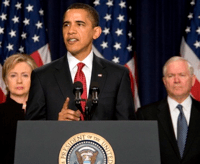For many years, the United States has been the world's most powerful nation. It remains the undisputed global leader in military power and still possesses vast economic and cultural influence. And while Washington's ability to combine both hard and soft power to influence world events -- what Joseph Nye calls "smart power" -- has diminished somewhat, it is still in a far superior position relative to any other country.
U.S. primacy, however, comes with opportunity costs. An alternate path might have delivered a comparable level of security at far less expense and risk. Even many who unabashedly celebrate our 20-year "unipolar moment" admit that their approach is costly and that it cannot last forever. They were the ones, after all, who dubbed it but a moment.
Rather than trying to make that moment last, U.S. policymakers should adopt policies that will allow us to extricate ourselves from regional squabbles, while maintaining the ability both to prevent genuine threats to the United States from forming and to deal with them decisively when prevention fails. Instead, even many who advocate for a smart power approach seem to assume that its goal should be to allow the United States to continue as the world's superpower -- and its policeman -- for the indefinite future.

